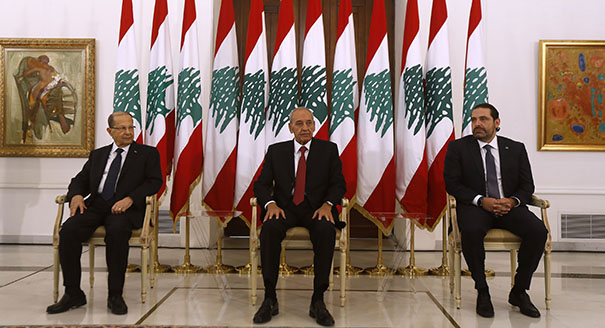Rosanna Bou Monsef | Senior editor at the Lebanese daily Al-Nahar
Putting in place a new cabinet in Lebanon cannot be isolated from the country’s regional context. There is a presumption that Iran is pushing for the formation of governments in both Iraq and Lebanon, ahead of scheduled U.S. sanctions on November 4 to limit Tehran’s oil exports. However, no one can exclude that blocking a Lebanese (or Iraqi) government might be a bargaining tool to alleviate such sanctions, even if Iran’s ally Hezbollah is not at the forefront of obstructing the government’s formation in Beirut. The process is being stymied by an ongoing struggle between the Free Patriotic Movement and the Lebanese Forces over Christian representation.
At the same time, the Arab countries are pushing for the quick formation of the government and fighting any unbalanced government that would favor Hezbollah and facilitate efforts to undermine the Taif Accord. Prime Minister-designate Saad Hariri’s recent optimism about the formation process was about denying all allegations that Saudi Arabia was obstructing this process.
Sami Nader | Director of the Levant Institute for Strategic Affairs, economist, and a lecturer at Université Saint Joseph in Beirut
I don’t think the formation of a cabinet will take much more time. For the last five months the stalemate could be summarized as follows: Hezbollah and its allies, who won the parliamentary elections, wanted Saad Hariri as prime minister, but on their conditions. Putting it differently, they were not ready to to cede what they considered to be their fair share inside the government.
Things seem different now. Hezbollah needs a national-unity government headed by Hariri to shelter it from mounting international pressure. Confronting Iran is the name of the game in Washington, and lately European countries joined the choir to sanction Iran. Economic sanctions on Hezbollah are going to increase, and the probability of an Israeli military strike is higher. In addition, all the stakeholders in Lebanon may finally realize that the economy is on the verge of collapse, so that further delay is dangerous. I wouldn’t be surprised if Hezbollah were to jump in to convince its allies of the necessity of a compromise.
Maha Yahya | Director of the Carnegie Middle East Center in Beirut
A government will be formed when Lebanese politicians recognize that that the country is on the edge of a precipice and regional actors decide that they have maximized their gains for now.
What has handicapped the government’s formation so far are significantly diverging interests. Mainly, there has been a tug for war between the two Christian political parties vying for future dominance over their community and for Lebanon’s presidency, in particular the effort of Gebran Bassil, the head of the Free Patriotic Movement, to position himself to succeed his father in law President Michel Aoun once he leaves the scene. This standoff has poisoned public discourse and revived civil war-era sentiment.
The reassertion of Syrian influence over the country’s politics is also polarizing Lebanese society as pressure by Hezbollah and its allies increases on the government to normalize with Damascus. The turning tide in Syria in favor of the regime makes it in the interest of Syria’s allies to have one of two things: Either a short-lived government or a delay in the government formation process, to ensure a more compliant leadership that accepts the revival of Syrian hegemony and turns Lebanon into an outlet through which Syria can engage with the world and possibly avoid international sanctions. For regime allies, this is the time to reap the gains of their investment in supporting the Assad regime, as they look to stave off attempts by the United States to weaken Iran.
While addressing all these concerns may feel like squaring a circle, the urgency of putting Lebanon back on track cannot be underestimated. Declining confidence in the country’s economy, increasing socioeconomic pressure, and an evident erosion in the country’s institutional fabric make it paramount for the political leadership to delay no longer.
Hanin Ghaddar | Friedmann visiting fellow at the Washington Institute for Near East Policy in Washington, D.C.
The Lebanese government formation process seems to have gone back to square one, after Prime Minister-designate Saad Hariri stated last week that the government would be formed within a week to ten days. Although he stressed that all parties had made concessions, there are still none from the two leading Christian parties blocking the process. Meanwhile, Hezbollah blamed the delay on “foreign intervention,” probably hinting at the position of the United States not to allow Hezbollah to get any service ministries, mainly the Health Ministry.
The question today is whether the government is going to improve the economic and political crises in Lebanon? It almost certainly will not. To genuinely help Lebanon recover, two fundamental processes need to be implemented: reforming state institutions, with strong accountability mechanisms; and containing Iran’s hegemony over Lebanon. As long as Iran continues to dominate Lebanon’s political and security decisions, and as long as corruption continues to deprive institutions from resources, Lebanon will remain isolated economically and politically, and will continue to disintegrate.
Many in Lebanon believe that the international community will intervene to help the country, because its stability seems to be more of a priority than corruption or even Hezbollah’s growing influence. Some believe that the Syrian refugee issue will prompt European governments to help save Lebanon from instability that could result from the misconduct of institutions and politicians. However, with shifts in policies in the United States and other countries, and an increased focus on Iran and its proxies in the region, Lebanon’s stability might not remain a top priority.








